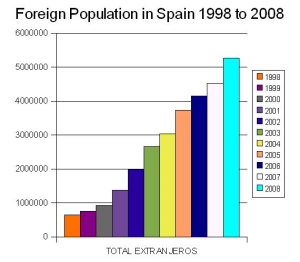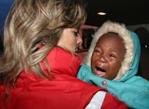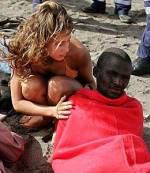

|
The Immigrant Wave and the ChurchesIn Spain, as well as the indigenous peoples, there can now be found three sizeable groupings of foreigners: northern Europeans, Morroccans and other north and west Africans of largely Muslim background and eastern Europeans together with Latin-Americans of at least nominal Christian background. Previously, perhaps the only people who were immigrating to Spain in largish numbers were pensioners from northern Europe in search of pleasant winter weather. In as much as there was an economic motive it had more to do with saving on heating costs and on the price of eating out than with any need. But now, things have changed. There has been a considerable growth in immigration over the past few years. Now 5.3 million are registered as resident in Spain, being over 11% of the population. More statisticsWhereas most of Europe saw large waves of immigration in prior decades, many Spaniards among them, now the tables are turned. Since the mid-1990s years many people have been arriving in Spain in search of work. The first to arrive, nationality by nationality were eastern Europeans as their frontiers opened up. Thus the very first were the Poles. Later, in a significantly larger number were Romanians. At the same time there began to be a slow but sure increase in immigration from north Africa, particularly Moroccans. At first the Poles and Romanians settled largely round Madrid, while the Moroccans settled in the agricultural areas north of Barcelona and in particular around Almería, where greenhouse agriculture was transforming the desert and the European food chain. The African dreamMany of these are illegal and crossed the straits of Gibraltar on rickety open boats often overflowing with would-be immigrants to Europe. Many have died in the attempt to reach the "promised land" of riches. To give an idea of the scale of the problem, on the night of 14th October 2003, 550 people were found attempting to land, 400 in southern Spain, the rest in the Canary islands, from 12 open boats. Almost daily during the summer months we hear of boats 'caught' by the Civil Guard police and of the ones who didn't make it being washed up on the rocks. During 2004 the number of open boat arrivals seems to have fallen. 19,176 people arriving this way were intercepted in 2003, but just 15,675 in 2004. But with 14 boats sinking, 81 people drowned and 60 more reported missing, the figures remain alarming. Even more alarming, perhaps, has been the surge in sub-Saharan arrivals and the thousands who during the summer of 2005 began to attempt to make mass assaults on the fence of Spain's enclave, Melilla, on African soil. Hundreds made it across the fence, swamping the detention centre in the enclave and causing an international outcry as first Spain, then Morocco decided to just return the illegals to the country they had just come from. In the Moroccan case, NGOs complained the blacks were simply being dropped off in the middle of the desert without food, water or medical care.During 2006 the flow of Black Africans began to flood across the Atlantic to the Canary Islands, not now from Morocco, nor even from Mauritania, where the Spanish Civil guard had based patrol boats, but now from Senegal and the Gambia. The number of arrivals shot up from 4,767 in 2005 to 31,378. The larger cayucos used are still open boats and the result is that many more suffer from dehydration on the long crossing if they make it at all. Bikini-clad tourists -or some of those original northern immigrants- can be found rescuing blacks stranded at holiday resorts. World meet world! At the turn of the millennium, these flows were joined by a flood of Latin-Americans, particularly from Ecuador and Colombia, taking advantage of visa-free tourist entry opportunities. Again, most of these outstayed their visa and became illegals. Laws have gradually tightened and visa restrictions put in place. At the millennium it was expected that by 2010 the immigrant population would represent 10% or more of the total, or up to five million people (INE). This percentage was virtually reached by 2006, particularly since many earlier immigrants are claiming Spanish nationality, available to those who have been legally resident here for over ten years (in the case of Latin Americans just 3 years). Unemployment is higher among immigrants (18%), particularly ones with a level of training. About one third work in "unqualified jobs" (i.e. hotel cleaners, agricultural labourers or construction workers) despite in many cases having qualifications. In the case of many Latins, qualifications do not easily bring job opportunities and the hope that their children will have a better life and reach university level is lower than their own experience. New Immigration rulesIn May '03 the Spanish government approved new rules governing immigration. With immigration, particularly of illegal immigrants from Africa, Latin America and eastern Europe, on the increase, the government has changed the rules several times in an attempt to curb it. The latest changes speed up expulsion, require carriers (basically airlines) to ensure all passengers fulfil the requirements of the law, including returning home, if their ticket is not one-way and on the other hand, confers on a visa the consideration as a work and residence permit. This brought Spain into line with both the Spanish High Court and European Directives. Nevertheless, Spanish authorities have continued to be 'more humanitarian' in their attitudes than some other EU governments and credit immigration with the much higher economic growth which Spain has seen since the turn of millennium. Thus, while many are certainly sent packing, others are being given papers in their home countries and a few still get them once they arrive. The hope is that migrants with papers will pay taxes and social security, thus sharing their new income with society as a whole. The Economist, on 22nd November 2007, published the findings of a European poll on attitudes to migration and said the following about Spanish attitudes: "Spain alone is thought by the European Commission to be home to some 547,000 adults of working age from Romania and Bulgaria. Yet Spaniards, according to a poll this month for France 24, a television station, appear untroubled. They have the sunniest attitudes of all Europeans towards migration, with 43% of respondents saying that immigrants are a boon to Europe and 55% believing that they are good for the economy." Challenges and opportunities for the churchesThe inflow of immigrants poses a number of unexpected challenges for the government, but also no less for the evangelical churches. It is clearly an objective both of Christianity and of Islam to extend by conversion and the challenge to the churches is by some more perceived as a threat. A number of ministries, however, are working in this area. However, by far the more imposing challenge and threat -although it should be seen as an opportunity- for most churches is the sudden arrival of the Latins and Romanians, many of whom are evangelicals or open to links with the churches. In the case of the Romanians, the language has been a barrier and eventually they have set up their own churches. In Arganda del Rey, Madrid, one of the region's largest evangelical churches is Romanian. In the case of the Latins, the linguistic affinity means that these immigrants just arrive in the churches. However, their culture is very different and their expectations of church life and activity is also. This poses unexpected challenges to the churches. Churches which had barely grown in the past ten years suddenly find there are more than twice as many in attendance and the established Spanish members feel threatened by demands that things change, even if only the style of music. Spaniards often emphasise Bible teaching, while many Latins expect the churches to be regularly doing evangelism, for example. This is obviously an area which demands prayer for sensitivity on all sides. FEREDE, the official evangelical representative body, also reckons there are now close on a million traditional protestants resident in Spain from northern Europe. Many are pensioners and do not speak Spanish to any great extent. Again, while churches exist for most of the communities, speaking English, German or Swedish for example, much more could be done to integrate these people into the main stream of evangelical activity in Spain, despite the age and language barriers. LinksGraphic display, spring 2005, from El Mundo BBC comment. There are a number of other articles on the topic at the BBC site. |



